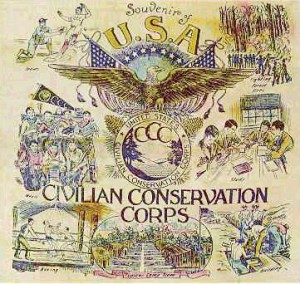 The Civilian Conservation Corps (or CCC) was instituted in 1933 by President Franklin Roosevelt to restore hope to America’s youth. The United States was in the midst of the Great Depression and suffered with 25% unemployment. Many had simply lost all hope.
The Civilian Conservation Corps (or CCC) was instituted in 1933 by President Franklin Roosevelt to restore hope to America’s youth. The United States was in the midst of the Great Depression and suffered with 25% unemployment. Many had simply lost all hope.
From inception to completion, nearly 3 million young men served in the CCC on projects around the country related to forestry, soil conversation, and flood and fire control. The commitment was 6 months to 2 years for any 18 to 24 year old male U.S. citizen for $30 per month. $25 per month was sent to the family.
The men of the CCC were also encouraged (but not required) to learn a trade and locally experienced men were hired to train them and supervise them back at camp. One request of FDR shows that partisan politics is not new to this era. FDR insisted that, where possible, all supervisors would be Democrats. Since that was a problem in the Smokies (not many Democrats here during those days), the supervisors were sternly warned not to discuss their political affiliation with the CCC men.
Interesting tidbits
- Camp David in Maryland was a CCC camp
- The Sugerlands CCC camp in the Great Smoky Mountains National Park was converted to a conscientious objector camp during World War II
- Some famous CCC camp alumni include Raymond Burr, Robert Mitchum and Frank Sinatra
- CCC constructed trails, planted trees, built bridges (the one at Sugarlands is still in use) and cut magnificent stone work along the roads in the Smokies as well as along the Blue Ridge Parkway.
- There were 77 CCC camps in Tennessee where 70,000 young men served.
Bryan’s opinions
The CCC was one of the few good New Deal programs that FDR implemented. Here are the reasons why
- Only the best New Deal programs don’t exist anymore. The CCC ended in 1942 with its objective complete (hope restored amongst American youth and unemployment was largely improved). Unfortunately, only the most wretched of New Deal programs survive to this day (namely the TVA and Social Security)
- The young men were required to work for their keep and provided great service. Their fingerprints are all over the national parks and forests and state parks here in Tennessee.
- Local men were employed to supervise the camps, thus helping the local economy.